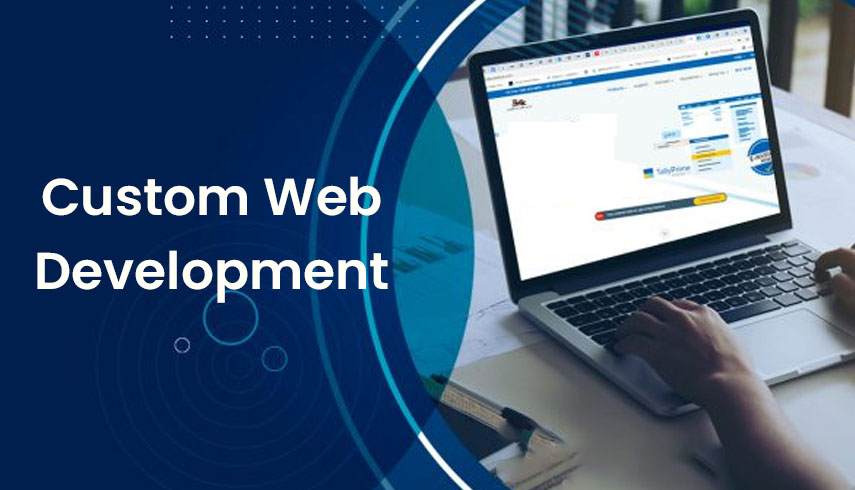WHO SHOULD HANDLE YOUR CUSTOM WEBSITE DEVELOPMENT PROJECT?
Building a strong online presence is crucial for businesses today. A key element of that presence is a professional website. While templates offer a quick solution, many businesses find that a custom website development approach better serves their unique needs. Let’s explore the various options available for custom website development and discuss some key trends shaping the industry.
Hiring a Web Development Agency
Partnering with an agency offers a comprehensive solution for your custom website development project. Agencies provide a wide range of services, from initial consultation and strategy development to design, development, testing, deployment, and ongoing maintenance.
They bring a wealth of experience and expertise to the table, ensuring your website is built to the highest standards and meets your specific business objectives.
When you choose an agency, you gain access to a full team of specialists, including designers, developers, project managers, and marketing professionals. This team collaborates to create a website that not only looks great but also functions seamlessly and drives results.
Agencies also have the resources and infrastructure to handle complex projects, ensuring your website can scale as your business grows. They stay up-to-date with the latest trends and technologies, ensuring
Your website is modern, secure, and optimized for performance.
Furthermore, agencies often offer additional services, such as search engine optimization services (SEO), content marketing, and social media management, to help you maximize your online presence. In addition to these core services, web development agencies often provide valuable insights and guidance throughout the website development process.
They can help you define your target audience, identify your key competitors, and develop a content strategy that resonates with your customers.
They can also advise you on the best technologies and platforms to use for your website, ensuring it is built on a solid foundation. Moreover, agencies can help you integrate your website with other business systems, such as CRM and ERP platforms, streamlining your operations and improving efficiency. They can also assist you with website migration and hosting, ensuring a smooth transition and reliable uptime.
When you partner with a web development agency, you are not just hiring a team of developers; you are gaining a strategic partner invested in your online success.
Expertise
Agencies employ teams of skilled designers, developers, and project managers. They possess in-depth knowledge of the latest technologies and best practices.
Full-Service: They handle all aspects of the project, from initial design and planning to development, testing, and deployment. Many offer ongoing maintenance and support.
Scalability: Agencies can scale their resources to match your project’s needs, whether a small business site or a large enterprise platform.
Cost
This option typically represents the highest investment.
Choosing a Web Development Agency
When selecting a web development agency for your custom website development, consider the following factors:
Portfolio
Review their past work to assess their design style and technical capabilities.
Client Testimonials: Seek feedback from previous clients to gauge their satisfaction with the agency’s services.
Communication
Evaluate their communication style and responsiveness to ensure a smooth collaboration.
Project Management: Inquire about their project management process to understand how they will handle timelines, milestones, and communication.
Specialization
If you have specific requirements, such as e-commerce integration or a particular technology stack, look for agencies with relevant expertise.
- Location While remote collaboration is common, some businesses prefer working with local agencies for in-person meetings and a better understanding of the local market.
- Culture Fit
Choose an agency whose values and work culture align with your own to foster a positive and productive partnership.
Benefits of Hiring a Web Development Agency
- Access to a Full Team: You gain access to a diverse team of specialists, each with their own area of expertise.
- Comprehensive Solutions: Agencies handle all aspects of the project, from design and development to testing and deployment.
- Industry Knowledge: They stay up-to-date with the latest trends and technologies in web development.
- Project Management Expertise: Agencies have established project management processes to ensure projects are delivered on time and within budget.
- Ongoing Support: Many agencies offer post-launch maintenance and support to keep your website running smoothly.
Hiring a Freelance Web Developer
Freelancers can be a good fit for specific custom website development projects.
- Cost-Effective: Freelancers often offer more competitive rates compared to agencies.
- Direct Communication: You’ll usually work directly with the developer, fostering clear communication.
- Flexibility: Freelancers may offer more flexibility in terms of scheduling and project scope.
- Expertise Varies: Freelancers specialize in different areas. Carefully evaluate their skills and experience.
Utilizing Your In-House Team
If your company has an in-house development team, they can handle your custom website development.
- Control: You maintain complete control over the project’s direction and execution.
- Business Knowledge: Your team intimately understands your business goals and target audience.
- Accessibility: They are readily available for ongoing maintenance and updates.
- Resource Allocation: Ensure this project aligns with your team’s existing workload and priorities.
DIY Website Builders
Website builders offer a user-friendly way to create a website, especially for those with limited budgets.
- Affordability: These platforms typically charge monthly or annual subscription fees, which are often lower than hiring a developer.
- Ease of Use: Drag-and-drop interfaces and pre-designed templates simplify the website creation process.
- Speed: You can quickly launch a basic website.
- Limited Customization: Complex functionalities may be challenging to implement.
Hybrid Approach
A hybrid approach combines different options for your custom website development.
- Flexibility: You can tailor the approach to your specific needs and budget.
- Cost Optimization: You can allocate resources strategically.
- Complexity Management: Handle simpler tasks in-house or via DIY platforms, while outsourcing complex development to agencies or freelancers.
Custom Website Development Trends and Statistics That You Should Know
The custom website development landscape is constantly evolving. Here are some key trends:
Mobile-First Design
- With mobile devices dominating internet usage, prioritizing mobile responsiveness is essential. (Stat: Over 50% of global website traffic comes from mobile devices – Statcounter).
- This means designing websites with a mobile-centric approach, ensuring optimal performance and user experience on smartphones and tablets.
- Mobile-first design involves prioritizing content and features for smaller screens, then progressively enhancing the experience for larger displays.
- This approach not only caters to the majority of internet users but also improves search engine rankings, as Google prioritizes mobile-friendly websites. Mobile responsiveness is not just about resizing elements; it’s about adapting the entire website structure, navigation, and functionality to provide a seamless and intuitive experience on mobile devices.
- This includes optimizing images, streamlining navigation menus, and ensuring fast loading speeds. Businesses that fail to prioritize mobile responsiveness risk alienating a significant portion of their target audience and falling behind in the competitive digital landscape. Therefore, mobile-first design is no longer a luxury but a fundamental requirement for any successful custom website development project.
User Experience (UX) Focus
- Businesses are increasingly recognizing the pivotal role of user experience (UX) in online success.
- They are investing heavily in UX design to craft websites that are not only visually appealing but also highly intuitive, engaging, and user-friendly.
- A well-designed UX focuses on understanding user needs, behaviors, and motivations to create seamless and enjoyable browsing experiences.
- This involves conducting user research, developing user personas, creating wireframes and prototypes, and conducting usability testing. By prioritizing UX, businesses aim to reduce bounce rates, increase user engagement, improve conversion rates, and foster customer loyalty.
- A positive user experience is crucial for attracting and retaining customers in today’s competitive digital landscape. It’s not just about aesthetics; it’s about creating a website that is easy to navigate, provides valuable content, and fulfills user expectations.
- Businesses are realizing that a well-executed UX strategy can significantly impact their bottom line, leading to increased revenue and brand reputation. Therefore, UX is no longer an afterthought but a core component of custom website development.
E-commerce Growth
- The continued expansion of online shopping drives demand for custom e-commerce solutions. (Stat: Global e-commerce sales are projected to surpass $8.1 trillion by 2026 – Statista).
- This surge in online retail necessitates robust and scalable e-commerce platforms that can handle high volumes of traffic, transactions, and product data.
- Businesses require custom-built e-commerce websites to differentiate themselves in a competitive market, offering unique features, personalized experiences, and seamless integrations with various business systems. Custom e-commerce development enables businesses to tailor their online stores to their specific products, target audience, and brand identity.
- This includes designing user-friendly interfaces, implementing secure payment gateways, optimizing product catalogs, and creating personalized marketing campaigns. Furthermore, custom e-commerce solutions provide the flexibility to integrate with existing CRM, ERP, and inventory management systems, streamlining operations and enhancing efficiency.
- As e-commerce continues to evolve, businesses need adaptable and scalable platforms that can accommodate future growth and changing consumer preferences. Custom e-commerce development empowers businesses to stay ahead of the curve, offering the agility to adapt to new technologies, implement innovative features, and provide exceptional customer experiences.
Personalization
- Custom websites allow businesses to tailor content and experiences to individual users.
Accessibility
- Websites must be accessible to users with disabilities.
Security
- Protecting user data and ensuring website security are paramount.
Final Thought
Choosing the right approach for your custom website development depends on a multitude of factors, including your budget, project scope, technical expertise, and business goals. However, careful evaluation of each option is crucial to find the best fit for your needs.
Consider the long-term implications of your decision, as your website will likely be a key component of your online presence for years to come. Don’t rush the process, and take the time to thoroughly research each option before making a final decision. Ultimately, the best approach is the one that aligns with your specific requirements and allows you to achieve your desired online presence.





Post Comment